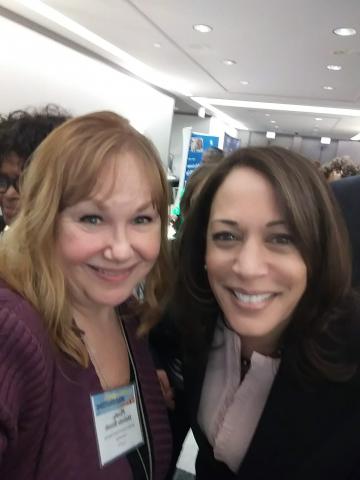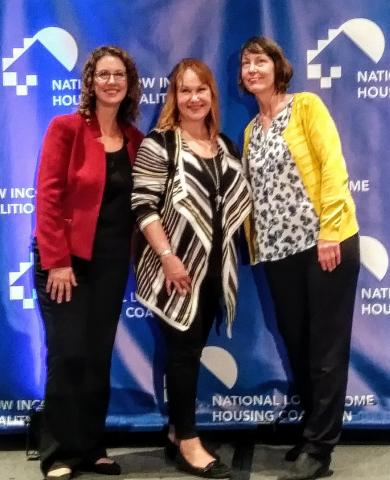Recent Blog Posts
Rachael Myers and Mindy Woods
Rachael Myers is executive director of the Washington Low Income Housing Alliance. Mindy Woods is an advocate with the Housing Alliance’s Resident Action Project (RAP) and a new member of the Housing Alliance’s board of directors. Together, they recently attended the National Low Income Housing Coalition’s annual housing policy forum in Washington, D.C. Here, the self-proclaimed “dynamic duo” share their experiences and insights.
“For me, I wanted the opportunity to connect with others, hear what’s working, what the challenges are,” shared Woods, reflecting on why she chose to travel to the forum in the middle of Washington state’s legislative session. Myers cited the importance of making progress at the federal level: “The federal government’s reduction of investment in housing over decades has had such an impact on the housing crisis and homelessness, here and everywhere. It’s a critical part of the solution, but we can’t have much of an impact on our own. To make a difference, we have to join up with folks from other states and be part of a strong national coalition that’s pushing really hard.”

An important part of Woods’ advocacy is her presence on social media. She uses Twitter to connect with lawmakers, journalists, and other advocates. “I organized an event in Edmonds, where I live. People attended who had experienced homelessness, and we tweeted pictures of ourselves to HUD Secretary Ben Carson and others with messages like, ‘I’m a renter and I vote.’” In fact, her success and creativity during last year’s week of action on affordable housing earned her an invitation to present at the forum in D.C.
The forum provides an opportunity for groups like the Housing Alliance from around the county to share strategies and ideas. “I was inspired by the organizing happening in Texas, and the great podcast that our counterpart, Texas Housers, produces,” said Myers. Washington state also earned some moments to shine, including interest in learning how we finally won a ban on source of income discrimination. Because of that legislation, landlords must allow tenants to use housing vouchers to pay the rent.
The Resident Action Project is a consistent draw. “Not many states have resident-led advocacy projects like we do in Washington,” shared Woods. “It’s really helped to have people who lived through these experiences [of homelessness or housing instability] and plug their experience into the Housing Alliance’s legislative agenda. When there’s a bill in Olympia, we have a pool of advocates where the bill has affected them personally.” Myers added: “We’ve learned a lot from the resident organizing happening in California and we hope RAP will inspire other states.”

Both were reminded of the importance of advocacy. “As bad as things are in D.C., the 2019 budget has $12 billion more for Housing & Urban Development than the President requested, and $1.5 billion more than the 2018 budget. Advocacy can make a difference even when things seem pretty awful,” Myers said. Woods encouraged everyone to get more involved: “There is always work to be done, at the local, state and national levels. I met people from all over the country working on housing justice. It makes me that much more determined and focused. When we all work together, everyone doing our parts, it all adds up to a big movement.”
You can support Mindy Woods’ advocacy by following her on Twitter at @HopeDealer19 and @RAPWashington.
To learn more about RAP, sign up at residentactionproject.org or join on Facebook.
Photos:
Mindy at the US Capitol
Mindy and Senator (and Presidential candidate), Kamala Harris
Mindy and Rachael with Diane Yentel, National Low Income Housing Coalition CEO


Add new comment